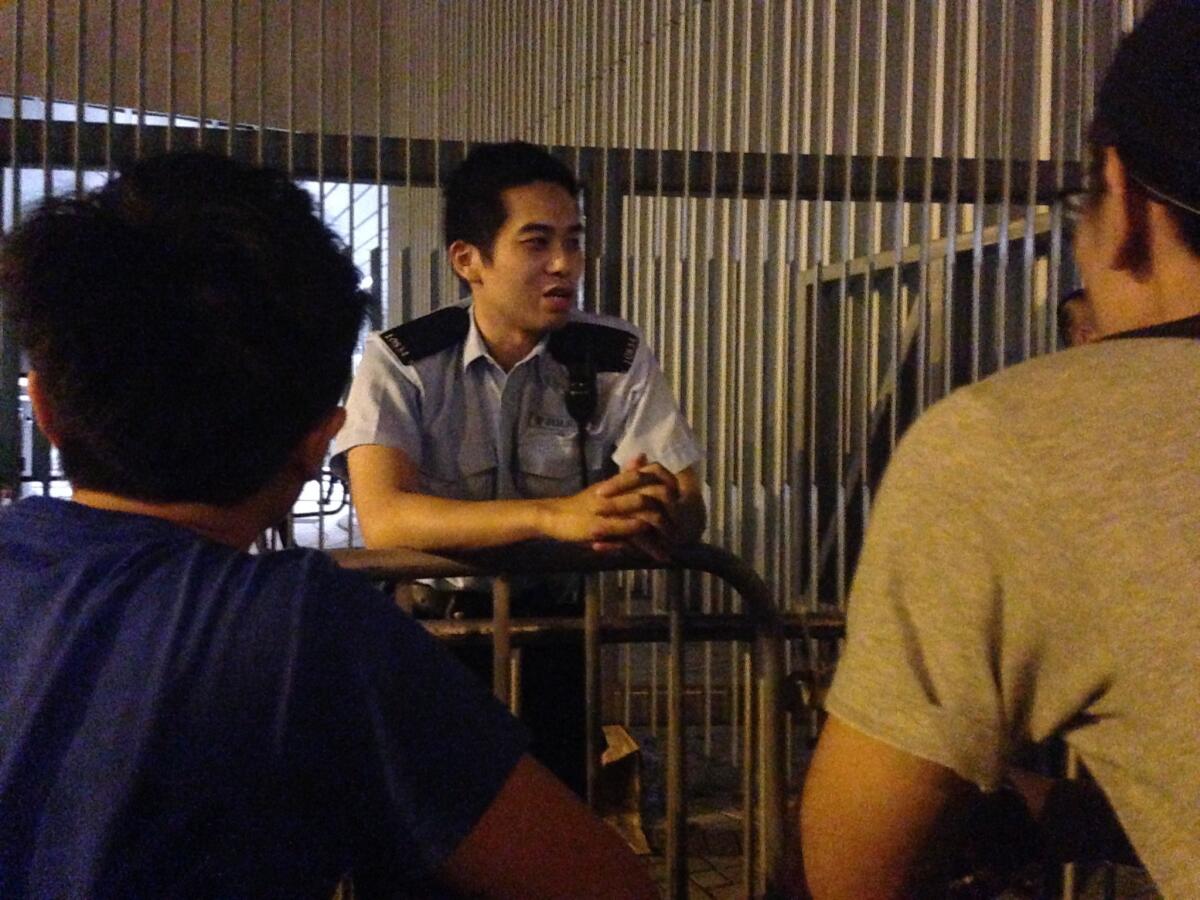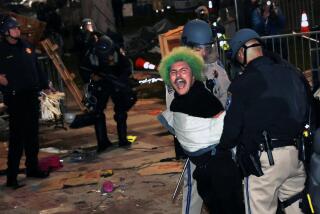From tear gas to talk: A Hong Kong policeman chats with protesters

- Share via
Reporting from Hong Kong — A week earlier, the officer may have been among Hong Kong’s finest in riot gear, firing tear gas canisters into crowds of pro-democracy protesters. But in the wee hours of Monday, standing sentry outside government headquarters in the Admiralty district, he was in blue shirtsleeves, engaging a dozen or so demonstrators in a much more cordial fashion.
“Let’s say the police got it all wrong,” said the officer, no name badge on display, a light breeze blowing in the night as the protests entered their ninth day. Just behind him stood the offices of Leung Chun-ying, the Beijing-backed chief executive of this semiautonomous city and one target of protesters’ ire; in front of him stood young protesters just on the other side of a chest-high metal barrier.
The officer’s hypothetical retreat from his position, ideological if not spatial, invited a prompt rebuttal.
“The government had it all wrong,” a young woman interjected. “If only Leung Chun-ying would come out to talk to us on the day we started the student strike....”
“Would you do that if you were him?” countered the officer, who later walked away without identifying himself. “If he comes out to talk with anyone, any group that starts some action, it just doesn’t work for someone of his status.
“You should put yourself in other people’s shoes. You shouldn’t just look at things from your perspective but should try to see things from others’ perspective,” the officer added. “If you can do that, you’ll do well in life.”
Part shooting the breeze, part shaking off grogginess, the officer’s impromptu salon was perhaps also an attempt to restore some of the public goodwill toward police after more than a week of tension and criticism.
In Hong Kong, the police have traditionally been accorded the kind of respect reserved for family members; children are taught to call officers “uncles.” Reports of police brutality are rare here, and the force takes much pride in its reputation for professionalism.
But the pro-democracy demonstrations that erupted late last month -- free-form, spontaneous and without permits -- were a jolt to a city long known for its massive but orderly protest culture that traditionally had people taking part in preauthorized marches and rallies in designated areas and along authorized routes.
As protesters filled the streets Sept. 28, shutting down major traffic arteries, police responded with a level of force not seen here in decades -- including pepper spray and 87 canisters of tear gas -- stunning many in this territory of 7 million. The chaotic scenes, broadcast live, motivated thousands more Hong Kongers to join the demonstrations on subsequent days.
The protest movement, at its core, has been agitating against new rules imposed by Beijing authorities that would limit voters’ choices in the 2017 election for chief executive, the territory’s top official.
With a row of his colleagues standing stoically and silent behind him in loose formation, the officer leaned forward, his eyelids heavy. Dark circles under his eyes seemed to suggest not just fatigue but also a world-weariness.
“What exactly are you guys fighting for? Even when we finally have a vote in a free election, do you seriously think you’ll have someone who can do anything?” he asked.
“This hasn’t happened yet,” countered a female protester.
“Well, it’s just a hypothesis,” the officer conceded, and quickly switched from politics to how the recent drama was causing him some personal predicaments.
“Do I think we police all are righteous people? No, we’re only enforcers of the law. If it’s all chaos all the time, then I’ll be out of a job,” he said.
The conversation ebbed and flowed. At one point, the officer confessed: “I’m so tired. The night has been so long. It’s so hard to kill time.”
Launching into a bit of a monologue, he said: “I’m just like you guys. I like to read stuff that I agree with. Just about everybody does that these days. I like to read things favorable to the police. But now, when I leaf through the newspaper, all I can see is the yellow ribbon everywhere,”; a reference to one symbol of the protests.
”;I don’t even want to talk to my friends now,”; he added. “;Some get mad at me even before I open my mouth.”
In a heartbeat, he turned from self-reflection to sympathy for his youthful adversaries. “Don’t get injured,” advised the officer. “Take care of yourselves or all the efforts you’ve made will come to nothing.”
Finally came the realization that, albeit on the opposite sides of the fence, they were all characters in the same drama, and in many ways their fates are inextricably intertwined.
“No matter how this ends, this will only deepen the division in our society,” said the officer. “Now that it’s begun, I’ll be with you guys, seeing it through.”
Law is a special correspondent.
More to Read
Sign up for Essential California
The most important California stories and recommendations in your inbox every morning.
You may occasionally receive promotional content from the Los Angeles Times.










